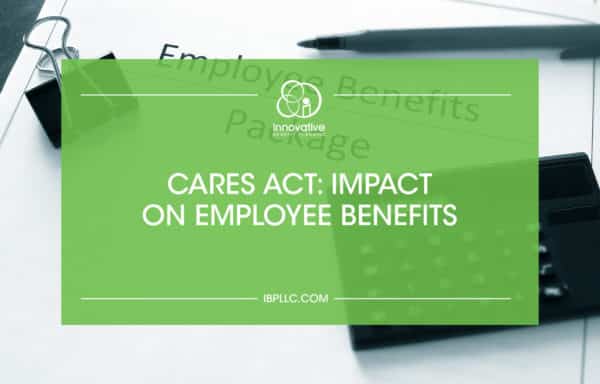CARES Act: Impact on Employee Benefits

CARES Act: Impact on Employee Benefits
On March 27, 2020, Congress passed, and the President signed, an unprecedented 2 trillion-dollar stimulus and relief package into law, named the Coronavirus Aid, Relief, and Economic Security Act or the CARES Act. This act provides direct stimulus relief to corporations and individuals. While there are many facets to this act, this brief serves to highlight the changes to employee benefits due to the CARES Act.
Expanded COVID-19 Testing
The Families First Coronavirus Response Act (FFCRA) required group health plans and insurers to provide coverage of certain diagnostic COVID-19 testing and related services without cost-sharing and without preauthorization. The CARES Act expands on these provisions:
-
All testing for COVID-19 must be covered without cost-sharing for fully insured and self-funded plans. In addition to tests approved by the FDA, this includes tests for which:
- the developer has requested, or intends to request, an emergency use authorization from the FDA,
- tests developed in and authorized by a state that has notified the Secretary of Health and Human Services (HHS) of its intention to review tests intended to diagnose COVID-19, or
- other tests that the HHS Secretary determines are appropriate;
-
Requires a group health plan or insurer to reimburse providers for such testing at either
- (1) the negotiated rate with such provider agreed on prior to the COVID-19 pandemic or
- (2) if no such negotiated rate exists (i.e. out-of-network providers), at a rate not greater than the cash price, which must be posted publicly by the provider.
Required Coverage of COVID-19 Vaccines and Other Preventive Treatments
If a COVID-19 vaccine, immunization, etc. are developed, the Act mandates coverage without employee cost-sharing for these preventive services. To qualify for this treatment, the preventive item or service must meet certain criteria as defined by the U.S. Preventive Services Task Force and/or the Advisory Committee on Immunization Practices.
Expanded Coverage of Telehealth Services by HDHPs
The Act includes a safe harbor allowing a high deductible health plan (HDHP) to cover telehealth or other remote care services, with no cost-sharing, prior to the participant’s meeting the plan deductible. This ensures the participant will maintain Health Savings Account eligibility. Note, this safe harbor is only for plan years beginning on or before December 31, 2021.
Expanded Use of HSAs, FSAs, and HRAs
Within the CARES Act, HSAs, FSAs, and HRAs can now be used to purchase over the counter medications without a prescription. The act also mandates that menstrual care products will be treated as qualified medical expenses and can also be purchased using an HSA, FSA, or HRA. These provisions are effective for expenses incurred and amounts paid after December 31, 2019.
Amendments to the FFCRA
The CARES Act makes several minor changes and clarifications to the FFCRA:
- Under the FFCRA, emergency paid FMLA leave is generally available to employees who have been employed for 30 days or more. The CARES Act modifies this rule, stating that employees laid off on or after March 1, 2020, that are then rehired by the employer can be eligible for paid family leave. The employee must have been employed for at least 30 of the prior 60 days. This effectively means that a rehired employee could be eligible for this paid leave immediately upon rehire.
- Per the FFCRA, employers are eligible to receive reimbursement for paid sick leave and family leave through tax credits, thus creating cash-flow concerns. To address this, The CARES Act created a process where employers can request an advance of anticipated tax credits. Further guidance on the specifics of this process is forthcoming from the IRS.
- The CARES Act provides funding to federal contractors for reimbursement of paid leave given to certain contract workers if they are unable to work or telework due to COVID-19.
- The CARES Act clarifies that the monetary caps for emergency paid sick leave and emergency FMLA leave under the FFCRA apply “for each employee”. (i.e. $511 per day per employee, etc.)
Innovative is committed to assisting employers in understanding how these regulations impact their employee benefits plan. Innovative is available for any questions relating to this brief or any other aspect of the CARES Act or visit our COVID-19 Employer Resource Center for daily updates.
For a downloadable PDF, click here.
Categories
Archive








